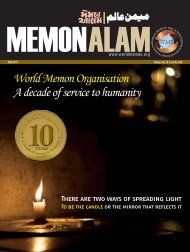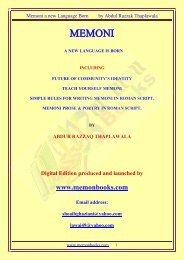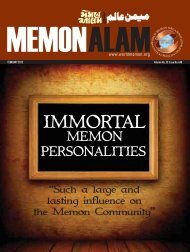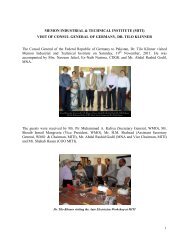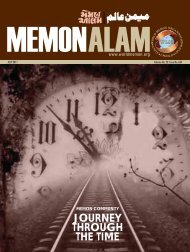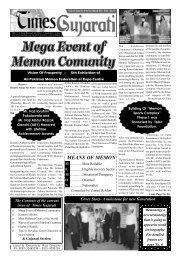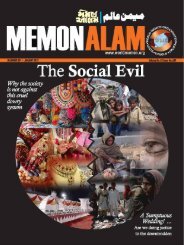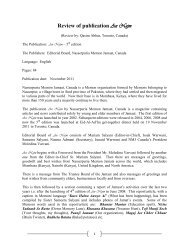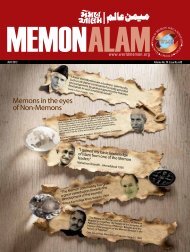WMO President's - Visit to Pakistan and India - World Memon ...
WMO President's - Visit to Pakistan and India - World Memon ...
WMO President's - Visit to Pakistan and India - World Memon ...
You also want an ePaper? Increase the reach of your titles
YUMPU automatically turns print PDFs into web optimized ePapers that Google loves.
HUMOR<br />
The Smart Game !!!<br />
There once lived a great mathematician<br />
in a village outside Ujjain .<br />
He was often called by the local<br />
king <strong>to</strong> advice on matters related<br />
<strong>to</strong> the economy. His reputation had spread<br />
as far as Taxila in the North <strong>and</strong> Kanchi in<br />
the South. So it hurt him very much when<br />
the village headman <strong>to</strong>ld him, “You may be a<br />
great mathematician who advises the king on<br />
economic matters but your son does not know<br />
the value of gold or silver.”<br />
The mathematician called his son <strong>and</strong><br />
asked, “What is more valuable - gold or<br />
silver?” “Gold,” said the son. “That is correct.<br />
Why is it then that the village headman makes<br />
fun of you, claims you do not know the value<br />
of gold or silver? He teases me every day.<br />
He mocks me before other village elders as a<br />
father who neglects his son. This hurts me. I<br />
feel everyone in the village is laughing behind<br />
my back because you do not know what is<br />
more valuable, gold or silver. Explain this <strong>to</strong><br />
me, son.”<br />
So the son of the mathematician <strong>to</strong>ld his<br />
father the reason why the village headman<br />
carried this impression. “Every day on my<br />
way <strong>to</strong> school, the village headman calls me<br />
<strong>to</strong> his house. There, in front of all village<br />
elders, he holds out a silver coin in one h<strong>and</strong><br />
<strong>and</strong> a gold coin in other. He asks me <strong>to</strong> pick<br />
up the more valuable coin. I pick the silver<br />
coin. He laughs, the elders jeer, everyone<br />
makes fun of me. And then I go <strong>to</strong> school.<br />
This happens every day. That is why they<br />
tell you I do not know the value of gold or<br />
silver.”<br />
The father was confused. His son knew the<br />
value of gold <strong>and</strong> silver, <strong>and</strong> yet when asked<br />
<strong>to</strong> choose between a gold coin <strong>and</strong> silver coin<br />
always picked the silver coin. “Why don’t you<br />
pick up the gold coin?” he asked. In response,<br />
the son <strong>to</strong>ok the father <strong>to</strong> his room <strong>and</strong><br />
showed him a box. In the box were at least<br />
a hundred silver coins. Turning <strong>to</strong> his father,<br />
the mathematician’ s son said, “The day I<br />
pick up the gold coin the game will s<strong>to</strong>p. They<br />
will s<strong>to</strong>p having fun <strong>and</strong> I will s<strong>to</strong>p making<br />
money.”<br />
The bot<strong>to</strong>m line is…<br />
Sometimes in life, we have <strong>to</strong> play the fool<br />
because our seniors <strong>and</strong> our peers, <strong>and</strong> sometimes<br />
even our juniors like it. That does not<br />
mean we lose in the game of life. It just means<br />
allowing others <strong>to</strong> win in one arena of the<br />
game, while we win in the other arena of the<br />
game. We have <strong>to</strong> choose which arena matters<br />
<strong>to</strong> us <strong>and</strong> which arenas do not.<br />
Why do some people<br />
get all the luck<br />
Why do some people get all the<br />
luck while others never get the<br />
breaks they deserve? A psychologist<br />
says he has discovered the answer. His<br />
study in his own words:--<br />
Ten years ago, I set out <strong>to</strong> examine luck.<br />
I wanted <strong>to</strong> know why some people are always<br />
in the right place at the right time, while<br />
others consistently experience ill fortune. I<br />
placed advertisements in national newspapers<br />
asking for people who felt consistently lucky<br />
or unlucky <strong>to</strong> contact me.<br />
Hundreds of extraordinary men <strong>and</strong><br />
women volunteered for my research <strong>and</strong> over<br />
the years, I have interviewed them, moni<strong>to</strong>red<br />
their lives <strong>and</strong> had them take part in experiments.<br />
The results reveal that although these<br />
people have almost no insight in<strong>to</strong> the causes<br />
of their luck, their thoughts <strong>and</strong> behaviour are<br />
responsible for much of their good <strong>and</strong> bad<br />
fortune. Take the case of seemingly chance<br />
opportunities. Lucky people consistently encounter<br />
such opportunities, whereas unlucky<br />
people do not.<br />
I carried out a simple experiment <strong>to</strong> discover<br />
whether this was due <strong>to</strong> differences in their<br />
ability <strong>to</strong> spot such opportunities. I gave both<br />
lucky <strong>and</strong> unlucky people a newspaper, <strong>and</strong><br />
asked them <strong>to</strong> look through it <strong>and</strong> tell me how<br />
many pho<strong>to</strong>graphs were inside. I had secretly<br />
placed a large message halfway through the<br />
newspaper saying: “Tell the experimenter you<br />
have seen this <strong>and</strong> win $50.”<br />
This message <strong>to</strong>ok up half of the page <strong>and</strong><br />
was written in type that was more than two<br />
inches high. It was staring everyone straight<br />
in the face, but the unlucky people tended <strong>to</strong><br />
miss it <strong>and</strong> the lucky people tended <strong>to</strong> spot it.<br />
• Unlucky people are generally more tense<br />
than lucky people, <strong>and</strong> this anxiety disrupts<br />
their ability <strong>to</strong> notice the unexpected.<br />
• As a result, they miss opportunities because<br />
they are <strong>to</strong>o focused on looking for something<br />
else.<br />
• They go <strong>to</strong> parties’ intent on finding their<br />
perfect partner <strong>and</strong> so miss opportunities <strong>to</strong><br />
make good friends.<br />
• They look through newspapers determined<br />
<strong>to</strong> find certain types of job advertisements<br />
<strong>and</strong> miss other types of jobs.<br />
• Lucky people are more relaxed <strong>and</strong> open,<br />
<strong>and</strong> therefore see what is there rather than<br />
just what they are looking for.<br />
• My research eventually revealed that lucky<br />
people generate good fortune via four principles.<br />
• They are skilled at creating <strong>and</strong> noticing<br />
chance opportunities, make lucky decisions<br />
by listening <strong>to</strong> their intuition, create selffulfilling<br />
prophesies via positive expectations,<br />
<strong>and</strong> adopt a resilient attitude that<br />
transforms bad luck in<strong>to</strong> good.<br />
Towards the end of the work, I wondered<br />
whether these principles could be used <strong>to</strong> create<br />
good luck. I asked a group of volunteers <strong>to</strong><br />
spend a month carrying out exercises designed<br />
<strong>to</strong> help them think <strong>and</strong> behave like a lucky<br />
person.<br />
Dramatic results! These exercises helped<br />
them spot chance opportunities, listen <strong>to</strong> their<br />
intuition, expect <strong>to</strong> be lucky, <strong>and</strong> be more<br />
resilient <strong>to</strong> bad luck. One month later, the<br />
volunteers returned <strong>and</strong> described what had<br />
happened. The results were dramatic: 80% of<br />
people were now happier, more satisfied with<br />
their lives <strong>and</strong>, perhaps most important of all,<br />
luckier.<br />
The lucky people had become even luckier<br />
<strong>and</strong> the unlucky had become lucky.<br />
Finally, I had found the elusive “luck fac<strong>to</strong>r”.<br />
Here are Professor Wiseman’s four <strong>to</strong>p tips<br />
for becoming lucky:<br />
1) Listen <strong>to</strong> your gut instincts - they are normally<br />
right<br />
2) Be open <strong>to</strong> new experiences <strong>and</strong> breaking<br />
your normal routine<br />
3) Spend a few moments each day remembering<br />
things that went well<br />
4) Visualize yourself being lucky before an<br />
important meeting or telephone call.<br />
Have a Lucky day <strong>and</strong> work for it..<br />
The happiest people in the world are not those<br />
who have no problems, but those who learn <strong>to</strong> live<br />
with them.<br />
MEMON ALAM APRIL 2011 45




